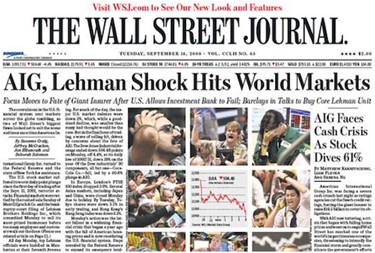Do you remember the start of 2008?
We sure do.
Trouble was brewing in the markets, but no one knew we were in store for the worst economic downturn since the Great Depression.
That summer, we (Chad and Cami) were still adjusting to married life and our move to Bend, and regardless of what was going on in the markets, we knew we wanted to offer clients something better — unbiased, transparent, and truly comprehensive financial planning. That meant it was time to leave the insurance/investment firm we worked for.
Yes, we look a bit dorky, but this was us in 2008!
With a six-month old baby at home and Cami cutting back to part-time work as she cared for our daughter, we left the corporate world and went independent, opening the doors of Eagle Wealth Management in July 2008.
Then September hit.
Talk about timing!
- The government seized control of Fannie & Freddie
- Lehman Brothers collapsed
- The government bailed out AIG
Needless to say, the economy was in a freefall.
It was beyond stressful, but as they say, there’s never a “right time” to start your own business.
There were many sleepless nights (not just because of our young children) over the next couple of years as the Great Recession took its toll on everyone and was more known for closing down businesses than being a great time to start a new one.
Why the trip down memory lane? Because last week marked our 15th anniversary! From just the two of us, we’re now a team of fifteen, offering everything from financial planning, wealth management, tax planning and preparation, and more!
How did we get here? It wasn’t because of massive advertising campaigns — it’s the support and trust our amazing clients placed in us.
Thank you for partnering with us, referring your friends and family to us, and helping us build Eagle Wealth into the company we have today. Here’s to 15 more years – and beyond!
To celebrate, here are a few photos from the last decade-and-a-half. We hope you enjoy!
With Gratitude,
Chad and Cami Staskal, founders of Eagle Wealth
2008 – Our first Eagle Wealth office.
2010 – Our team started growing…
2015 – ...and growing...
...and growing (2022 Christmas party)!
2019 – time for a larger office
2020 – made it through remote work during Covid
2022 – We formed a tax team (2021) and began to officially celebrate the end of tax season
2023 - Chad & Cami – a bit older, and hopefully wiser too!

How To Use Coffee Grounds In Your Garden
Not only does coffee give us the caffeine some of us need to power through the day, but it can also give your garden the boost it needs to grow and thrive! Coffee grounds can improve your soil, deter pests, and give your plants the necessary nutrients. Cami experienced this firsthand while growing up in Silverton, Oregon. Her mom attributed her beautiful roses to the coffee grounds she threw on the soil!
To add coffee grounds to your garden, you can add them to your existing compost material or directly to the soil itself. Coffee grounds are “green” composting materials that are rich in nitrogen. Because of this, ensure you balance your compost with brown materials such as newspaper, cardboard, or dead plant material.
If you add the grounds directly to the soil, sprinkle them evenly rather than dump them in piles so they can expel nitrogen into the soil. Want to know more? Check out this article from The Spruce.
Tip adapted from The Spruce7 |
|

The Week on Wall Street
Stocks moved to the rhythm of earnings season last week, initially rising on positive earnings surprises and faltering later in the week on key earnings disappointments.
The Dow Jones Industrial Average rose 2.08%, while the Standard & Poor’s 500 added 0.69%. The Nasdaq Composite Index slumped 0.57% for the week. The MSCI EAFE index, which tracks developed overseas stock markets, slipped 0.32%.1, 2, 3
Earnings in Focus
Entering its first big week of the second quarter earnings season, solid reports from the nation’s big banks rewarded investor optimism, sparking a rally that continued into mid-week. An announcement by a mega-cap tech company of a new AI subscription plan, and stabilizing deposits at several regional banks, further fed investor enthusiasm. Disappointing earnings from two big-tech names dragged market indices lower on Thursday, with the largest losses in the Nasdaq composite. Despite the reversal, 20 stocks in the S&P 500 touched 52-week highs on Thursday, with 11 reaching all-time highs.4 Stocks closed flat to end an otherwise mixed week.
Housing Hits a Bump
June housing reports reminded investors that any emerging housing recovery remains shaky. After a massive 21.7% jump in housing starts in May, new home construction tumbled 8.0% in June, with building permits (an indicator of future home construction) dropping 3.7%.5 Sales of existing homes were also lower in June, declining by 3.3%, owing to a persistently low inventory level. This was the slowest pace since January. Year-over-year sales were lower by 18.9%. One reason for low inventory is that homeowners have been reluctant to sell homes on which many have a historically low mortgage rate and face buying a new home at elevated prices with a much higher mortgage interest rate.6 |
|
Any companies mentioned are for informational purposes only, and this should not be considered a solicitation for the purchase or sale of their securities. Any investment should be consistent with your objectives, time frame, and risk tolerance
|
|
Advisory Services offered through My Legacy Advisors, LLC dba Eagle Wealth Management, a registered investment advisor. Tax services offered through EWA. Confidential Information: This message and any attachments contain information from Eagle Wealth Management, which may be confidential and/or privileged and is intended for use only by the addressee(s) named on this transmission. If you are not the intended recipient, or the employee or agent responsible for delivering the message to the intended recipient, you are notified that any review, copying, distribution or use of this transmission is strictly prohibited. If you have received this transmission in error, please (i) notify the sender immediately by e-mail or by telephone and (ii) destroy all copies of this message. |
|
1. The Wall Street Journal, July 21, 2023. 2. The Wall Street Journal, July 21, 2023. 3. The Wall Street Journal, July 21, 2023. 4. CNBC, July 20, 2023. 5. Yahoo!Finance, July 19, 2023. 6. The Wall Street Journal, July 20, 2023. 7. The Spruce, https://www.thespruce.com/using-coffee-grounds-in-your-garden-2539864
Investing involves risks, and investment decisions should be based on your own goals, time horizon, and tolerance for risk. The return and principal value of investments will fluctuate as market conditions change. When sold, investments may be worth more or less than their original cost. The forecasts or forward-looking statements are based on assumptions, may not materialize, and are subject to revision without notice. The market indexes discussed are unmanaged, and generally, considered representative of their respective markets. Index performance is not indicative of the past performance of a particular investment. Indexes do not incur management fees, costs, and expenses. Individuals cannot directly invest in unmanaged indexes. Past performance does not guarantee future results. The Dow Jones Industrial Average is an unmanaged index that is generally considered representative of large-capitalization companies on the U.S. stock market. Nasdaq Composite is an index of the common stocks and similar securities listed on the NASDAQ stock market and is considered a broad indicator of the performance of technology and growth companies. The MSCI EAFE Index was created by Morgan Stanley Capital International (MSCI) and serves as a benchmark of the performance of major international equity markets, as represented by 21 major MSCI indexes from Europe, Australia, and Southeast Asia. The S&P 500 Composite Index is an unmanaged group of securities that are considered to be representative of the stock market in general. U.S. Treasury Notes are guaranteed by the federal government as to the timely payment of principal and interest. However, if you sell a Treasury Note prior to maturity, it may be worth more or less than the original price paid. Fixed income investments are subject to various risks including changes in interest rates, credit quality, inflation risk, market valuations, prepayments, corporate events, tax ramifications and other factors. International investments carry additional risks, which include differences in financial reporting standards, currency exchange rates, political risks unique to a specific country, foreign taxes and regulations, and the potential for illiquid markets. These factors may result in greater share price volatility. Please consult your financial professional for additional information. This content is developed from sources believed to be providing accurate information. The information in this material is not intended as tax or legal advice. Please consult legal or tax professionals for specific information regarding your individual situation. This material was developed and produced by FMG Suite to provide information on a topic that may be of interest. FMG is not affiliated with the named representative, financial professional, Registered Investment Advisor, Broker-Dealer, nor state- or SEC-registered investment advisory firm. The opinions expressed and material provided are for general information, and they should not be considered a solicitation for the purchase or sale of any security. Copyright 2023 FMG Suite. |
|
















